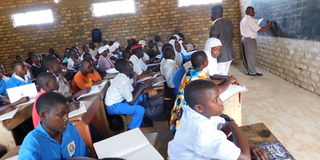Reopening schools: Naming a date is not all we need

I read with disbelief, that Shs11billion teachers’ Sacco money, had been embezzled. I was struck by the reality, considering the fact that a number of teachers reportedly committed suicide and majority are struggling, due to unpleasant effects of the closure of schools.
This development (the theft), coincided with information regarding the consideration of reopening of educational institutions, particularly for finalists in a week’s time from now.
Schools were closed in March this year, to curb the spread of Covid-19, owing to their high concentration. Teachers and learners have since then, been patiently waiting for the resumption of business. Government had previously planned to reopen schools in May, an arrangement that was never realised.
The education sector is one of those that have been greatly affected by the pandemic. This, therefore, requires committed interventions by all stakeholders, the government being the major stakeholder. I believe the Education ministry just naming a date for the reopening of schools, and outlining standard operating procedures may not yield the desired outcome.
A report published in August, by BESO Foundation, a local rural-based education NGO, indicated that 53 per cent of private schools are unable to resume business. In addition, the report also indicated that 68 per cent of private schools cannot adhere to the standard operating procedures (SOPs).
The report reflects earlier fear, expressed by the National Planning Authority (NPA), that more than 4,300 private institutions risked closing, as a result of the schools shutdown. Their closure is estimated to cost approximately two million learners. NPA also indicated that 64.6 per cent of parents may struggle or even fail to raise fees after the reopening of schools.
I believe a big majority of teachers in private institutions at all levels, have either received half or no payment throughout the lockdown. It is not surprising since the institutions’ major source of income is school fees. There’s no way schools would continue paying staff without earning.
Teachers have thus ventured in numerous projects for a living.
Even after reopening, private schools that may brave and reopen may not be in position to raise salaries for their staff. The enrollment projections are alarming and the ability of parents to raise fees is not guaranteed. The education institutions thus need a bailout.
The above statistics present a critical dilemma. And thus leave me wondering whether even after confirming the reopening date, schools will practically operate. Should we risk two million learners out of school? Should we expose our children to Covid-19 as a result of a schools inspection workforce, that could be bribed to allow schools operate without adhering to SOPs? We need a comprehensive approach to the challenges raised by those reports.
Interventions
Key players in the education sector, most especially the proprietors, teachers, legislators and education NGOs, should task the government to come up with a comprehensive intervention plan that will enable schools to operate smoothly.
The government has been receiving Covid-19 education response grants from international donors, which I believe should be put to their task. It is disheartening remembering the billions wasted on media instruction, against advice from educationists.
However much the country badly wants the schools reopened, to curb the shutdown’s disastrous effects like the increase in child pregnancy, the prevailing circumstances and the laxity of the government may not work in favour of the programme. It is surprising that the ministry is still uncertain of the third term capitation grants for government funded schools.
The cry from private schools proprietors for help should be taken seriously. This is the only way schools shall be in position to safely reopen for learners. The government needs to commit reasonable amounts as loans to the respective institutions with fair repayment terms, since majority are still struggling to pay bank loans taken prior to closure.
Reopening without clearly examining the readiness of schools may do more harm than good.
A section of teachers have sworn not to ‘return to the chalk’, having found a better option. We may end up with learners but without teachers to foster the learning in a number of schools. Even teachers that will return need rehabilitation and reorientation if they’re to effectively help the learners.
We may badly want our children back to school, but it appears the government has not effectively planned their return. The Education ministry should give more practical hope beyond naming a reopening date and SOPs and instead provide tangible assistance to the education institutions, and have clear plans for monitoring the implementation of SOPs.
Najib. N. Ssekikubo is an educationist and a Sociopolitical commentator.



